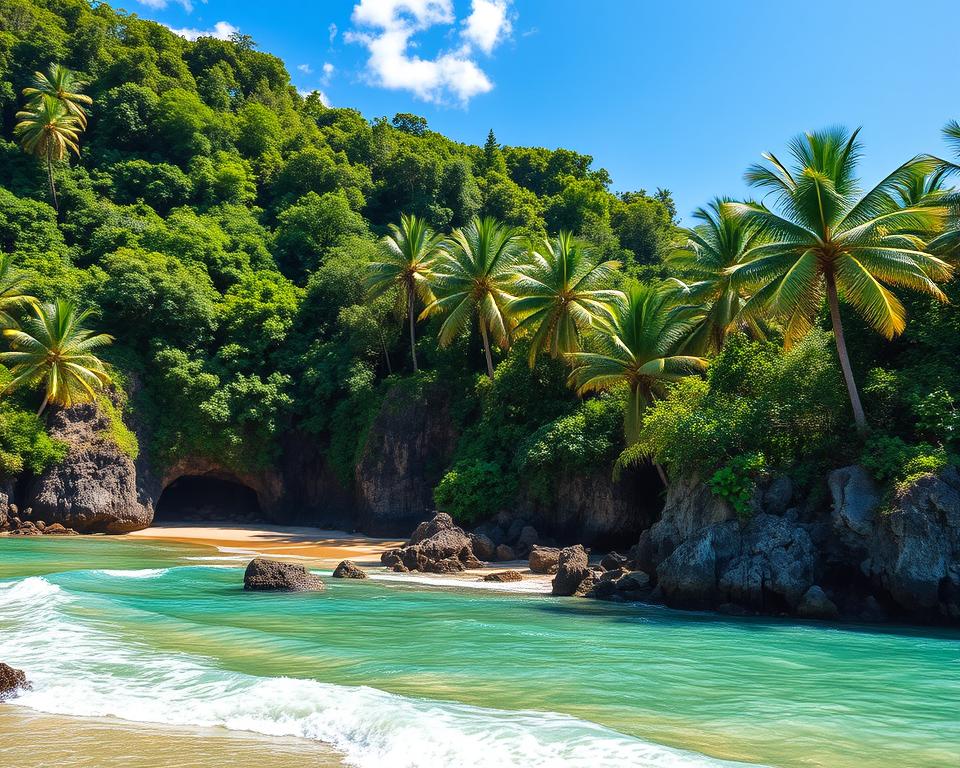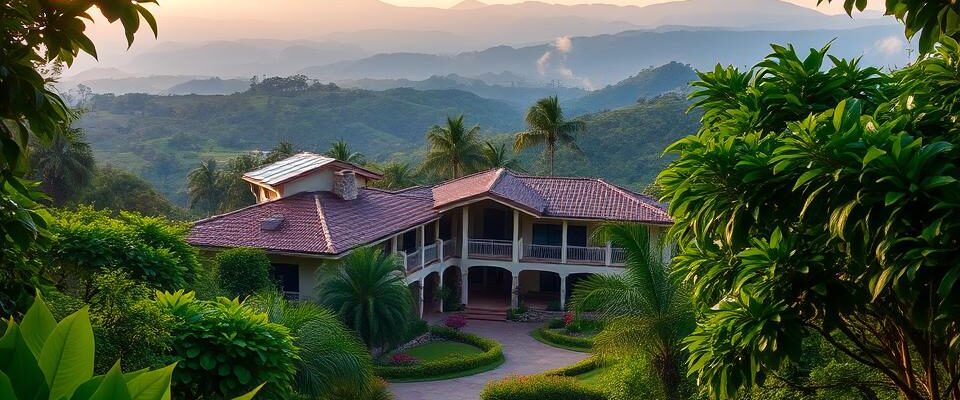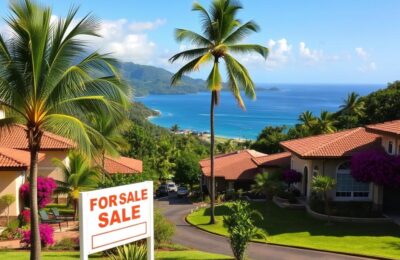Real Estate Purchase Tips in Costa Rica – Trusted Local Expertise
Costa Rica‘s thriving property market. With over two decades of coast-to-coast experience, we deliver seamless transactions through expert guidance and clear communication.
Costa Rica continues to attract international buyers seeking second homes, retirement properties, and investment opportunities due to its stable democracy and natural beauty. Our trusted local expertise will guide you through the process, ensuring a successful real estate transaction.
Whether you’re looking for a beachfront villa or mountain retreat, understanding the nuances of Costa Rica‘s property market is essential. We cover everything from foreign ownership rights to regional market insights, helping you navigate the process with confidence.
Understanding Costa Rica’s Real Estate Market
Costa Rica’s real estate market has been gaining significant attention from foreign investors in recent years. Over the past three years, foreign investment in Costa Rica real estate has increased by more than 30 percent, according to the Costa Rican Chamber of Real Estate Brokers.
The Growing Appeal of Costa Rican Property
Many investors are drawn to Costa Rica for its rental income potential. Popular areas like Samara, Nosara, and Tamarindo attract both long-term residents and tourists, generating strong demand for short-term vacation rentals and long-term leases. The country’s stable economy and beautiful landscapes make it an attractive destination for property buyers.
Market Trends and Investment Opportunities
The Costa Rican real estate market has shown resilience even during global economic downturns, with property values in prime locations maintaining stability or appreciating over time. Emerging markets in previously underdeveloped areas are creating new investment opportunities at lower entry points, with potential for significant appreciation as infrastructure improves.
- Beachfront and ocean-view properties continue to command premium prices, particularly in established tourist destinations along the Pacific coast.
- The vacation rental market presents strong income potential in tourist-heavy regions, with properties in prime locations achieving high occupancy rates during peak seasons.
- Sustainable and eco-friendly developments are gaining traction as buyer preferences shift toward environmentally responsible living options.
The post-pandemic trend of remote work has increased demand for properties with home office capabilities and reliable internet connectivity, expanding the potential buyer pool beyond traditional retirees and vacation home seekers.
Foreign Ownership Rights in Costa Rica
When purchasing property in Costa Rica, it’s essential to understand the rights and regulations surrounding foreign ownership. Costa Rica is known for its welcoming attitude towards foreign investors, but there are specific laws and regulations that govern property ownership, particularly in coastal areas.
Equal Property Rights for Foreigners
Foreigners have the same property rights as Costa Rican citizens, with some exceptions. They can own property outright, rent, or enter into other agreements. However, certain restrictions apply, particularly in the Maritime Zone.
Understanding Fee Simple Title Ownership
Fee simple title ownership is a type of ownership where the buyer has complete and absolute ownership of the property. This is the most common form of ownership in Costa Rica and provides the owner with full rights to the property.
Maritime Zone Regulations and Restrictions
The Maritime Zone Law regulates properties within 200 meters of the high tide line. The first 50 meters are considered public land, and the next 150 meters are concession land. Foreigners can own up to 49% of a Costa Rican corporation that holds a concession in this zone.

Understanding these regulations is crucial for foreign investors. While Costa Rica offers attractive opportunities for property buyers, navigating the legal landscape is essential to ensure a smooth transaction.
Types of Properties Available in Costa Rica
Costa Rica offers a diverse range of properties for investment or personal use, catering to various preferences and needs. From luxurious beachfront villas to secluded mountain estates, the options are vast and varied.
Beachfront and Ocean View Properties
Beachfront properties in Costa Rica are highly sought after for their stunning views and direct access to some of the world’s most beautiful beaches. These properties range from modern apartments to spacious villas.
Mountain and Jungle Estates
For those seeking tranquility and a connection with nature, Costa Rica’s mountain and jungle estates offer a serene retreat. These properties often feature private reserves, waterfalls, and breathtaking views.
Urban and Suburban Homes
Urban and suburban areas in Costa Rica provide a more conventional lifestyle, with modern amenities and services. These homes range from apartments in city centers to spacious houses in gated communities.
Undeveloped Land and Investment Opportunities
Costa Rica also has an abundance of undeveloped land and farmland, offering opportunities for agricultural projects, conservation efforts, or long-term development. Investors can explore various options, including:
- Undeveloped land as an affordable entry point into the Costa Rican real estate market, with potential for appreciation.
- Agricultural land for producing coffee, tropical fruits, and timber.
- Conservation land for environmental preservation, potentially qualifying for government incentives.
- Strategic land banking in areas with planned infrastructure improvements.
Essential Real Estate Purchase Tips in Costa Rica
With its unique blend of natural beauty and investment potential, Costa Rica’s real estate market demands a thoughtful approach. Navigating this market confidently requires deep local knowledge and insight.
Working with Licensed Real Estate Professionals
Working with a licensed real estate agent in Costa Rica is crucial for a successful transaction. They can provide valuable insights into the local market, help you find the right property, and guide you through the buying process.
Conducting Thorough Due Diligence
Conducting thorough due diligence is essential when purchasing property in Costa Rica. This includes verifying the property’s title, checking for any outstanding liens, and ensuring that the property boundaries are clearly defined.
- Verify the property’s title and check for any outstanding liens.
- Ensure that the property boundaries are clearly defined and marked.
- Check for any environmental or zoning restrictions.
Due diligence is critical in avoiding potential pitfalls, such as squatters’ rights issues, especially on undeveloped or remote land.
Understanding Property Boundaries and Access
Understanding property boundaries and access rights is vital in Costa Rica. Property boundaries may not always be clearly marked, and access rights can be complex, especially for landlocked properties.
- Verify that the property has clear access rights.
- Check that any existing easements are properly registered.
- Understand how easements might affect your use and enjoyment of the land.
By working with a knowledgeable real estate professional and conducting thorough due diligence, you can navigate Costa Rica’s real estate market with confidence.
The Step-by-Step Property Buying Process
Buying property in Costa Rica can be a complex process, but understanding the steps involved can make it more manageable. We will guide you through the essential stages to ensure a smooth transaction.
Property Search and Selection
The first step in buying property in Costa Rica is to identify your needs and preferences. This involves deciding on the type of property, location, and budget. Working with a licensed real estate agent can help streamline this process by providing access to a wide range of properties and local market knowledge.

Making an Offer and Negotiation
Once you’ve selected a property, the next step is to make an offer. This involves negotiating the price and terms of the sale. In Costa Rica, it’s common for negotiations to be facilitated by a real estate agent who can help reach a mutually agreeable deal.
Due Diligence Period
After an offer is accepted, the due diligence period begins. This critical phase involves verifying the property’s legal status, checking for any outstanding liens, and ensuring that the property boundaries are correctly defined. A local attorney can be invaluable during this stage.
Closing the Transaction
The final step is closing the transaction, which typically occurs 30-60 days after signing the purchase-sale agreement. During this stage, a Notary Public drafts and registers the property transfer deed. It’s essential to ensure that funds for the closing are transferred in advance, as international wires can have holding periods.
At closing, the buyer typically pays the remaining balance, and the Notary Public handles the registration of the property with the National Registry, completing the transfer of ownership.
Legal Considerations When Buying Property
When purchasing property in Costa Rica, it’s essential to understand the legal landscape to avoid potential pitfalls.
The Role of a Real Estate Attorney
A real estate attorney plays a vital role in ensuring that your property transaction is handled legally and efficiently. They provide guidance on the legal aspects of the purchase, review contracts, and help resolve any disputes that may arise.
Title Search and Property Registry
Conducting a thorough title search and registering the property are critical steps in the buying process. This ensures that the property is free from any liens or encumbrances and that your ownership is legally recognized.
The Importance of a Public Notary
In Costa Rica, a Public Notary is indispensable in real estate transactions. They are responsible for drafting and registering the property transfer deed, verifying the identities of the parties involved, and ensuring that all legal requirements are met.
The Notary Public, who is a licensed attorney with special certification, calculates and collects transfer taxes and registration fees. After the transaction is closed, they submit the transfer deed to the National Registry and maintain the original documents in their protocol books.
Financial Aspects of Costa Rican Real Estate
Navigating the financial aspects of Costa Rican real estate requires knowledge of closing costs, property taxes, financing options, and currency considerations. Understanding these elements is crucial for a successful and stress-free transaction.
Understanding Closing Costs
Closing costs in Costa Rica typically range from 3-5% of the purchase price and include fees for title search, notary services, and registration. It’s essential to factor these costs into your budget to avoid surprises at closing.
Property Taxes and Annual Expenses
Property taxes in Costa Rica are generally low, around 0.25-0.5% of the property’s value annually. However, other expenses such as utilities, maintenance, and potential community fees should also be considered when calculating the total cost of ownership.
Financing Options for Foreign Buyers
While financing options for foreign buyers in Costa Rica may be limited compared to their home country, some local banks offer mortgage products tailored to international clients. It’s crucial to explore these options and understand the terms and conditions.
Currency Considerations and Exchange Rates
Most real estate transactions in Costa Rica are conducted in US dollars. However, exchange rate fluctuations can significantly impact the effective cost of property for buyers converting from other currencies. Using escrow services and monitoring exchange rates can help mitigate these risks.
- Most transactions are in US dollars, simplifying the process for international buyers.
- Exchange rate fluctuations can impact the final cost of the property.
- Using escrow services can provide security and simplify currency exchange.
- Some buyers use forward contracts to lock in favorable exchange rates.

Common Pitfalls and How to Avoid Them
Navigating Costa Rica’s property market requires understanding the potential pitfalls that can impact your transaction. As foreign investors face unique challenges, being informed is key to a successful purchase.
Inadequate Due Diligence Risks
Inadequate due diligence can lead to significant risks when buying property in Costa Rica. Ensuring that your real estate attorney conducts a thorough title search and that you understand all aspects of the property, including any debts or liens associated with it, is crucial.
Misunderstanding Maritime Zone Regulations
The Maritime Zone in Costa Rica has specific regulations that can affect property ownership, particularly for foreigners. Understanding these regulations and how they impact your purchase is vital to avoiding legal complications.
Language Barriers and Cultural Differences
Language barriers and cultural differences can significantly impact your Costa Rican real estate transaction. Working with bilingual professionals is essential to avoid misunderstandings, as all official documents are in Spanish. Cultural nuances, such as the relaxed approach to time embodied in “Pura Vida,” can also affect business dealings. Being aware of these differences can help manage expectations and lead to a smoother transaction.

By understanding these common pitfalls and taking steps to avoid them, buyers can ensure a more successful and stress-free transaction in Costa Rica’s vibrant real estate market.
Regional Guide to Costa Rica Real Estate
Exploring Costa Rica’s real estate market reveals various regions, each with its unique charm and investment potential. As we delve into the different areas, you’ll discover opportunities that cater to various tastes and investment goals.
Pacific Coast Properties
The Pacific Coast is renowned for its stunning beaches and vibrant communities. Areas like Tamarindo and Playa Hermosa are popular among surfers and beach lovers, offering a range of properties from condos to luxury villas.
Central Valley Opportunities
The Central Valley is characterized by its mild climate and picturesque landscapes. Cities like San José and Alajuela offer a mix of urban and suburban living, with properties ranging from apartments to large estates.
Caribbean Coast Investments
The Caribbean Coast is known for its laid-back atmosphere and beautiful beaches. Areas like Puerto Viejo and Cahuita are attracting investors with their natural beauty and growing tourism infrastructure.
Emerging Markets and Areas
Several emerging regions in Costa Rica are gaining attention for their potential and lower entry points. The Southern Nicoya Peninsula, the Southern Zone, and mountain communities like San Ramón are among these areas, offering opportunities for investors willing to explore beyond the traditional markets.
Why Choose Gap Real Estate as Your Trusted Partner
With years of expertise and a client-centered approach, Gap Real Estate stands out as a trusted name in Costa Rica’s property market. Our extensive experience and in-depth knowledge of the local real estate landscape make us the ideal partner for your property journey in Costa Rica.
20+ Years of Coast-to-Coast Expertise
Our two decades of experience in Costa Rica’s real estate market have equipped us with the knowledge and insights needed to navigate its complexities. From beachfront properties to mountain estates, our coast-to-coast expertise ensures that we can cater to a wide range of client needs and preferences.
Comprehensive End-to-End Support
At Gap Real Estate, we offer comprehensive support throughout the entire property buying process. Our services include:
- Personalized property searches tailored to your specific needs
- Expert guidance through the due diligence process
- Negotiation strategies designed to achieve optimal outcomes
- Streamlined transaction processes to ensure a smooth closing
Results-Driven Service and Client Success
Our commitment to your success is unwavering. We measure our success by your satisfaction and the achievement of your real estate goals in Costa Rica. By maintaining transparent communication, providing honest assessments, and leveraging our negotiation strategies, we ensure that your property journey is both stress-free and successful.
Whether you’re looking to find your dream home or secure a strategic investment, we’re here to simplify every step, ensuring clarity, confidence, and a stress-free experience. At Gap Real Estate, your interests are always our top priority.
Conclusion
Navigating Costa Rica’s property market requires understanding local laws and market dynamics. With the right guidance, purchasing real estate in Costa Rica can be a rewarding experience. Our diverse regions offer a wide range of opportunities for lifestyle and investment. At Gap Real Estate, we provide comprehensive support and coast-to-coast expertise to guide you through every step. For more information or to begin your property search, visit www.gaprealestate.com, call or WhatsApp us at +(506)-4001-6413, or email [email protected].




